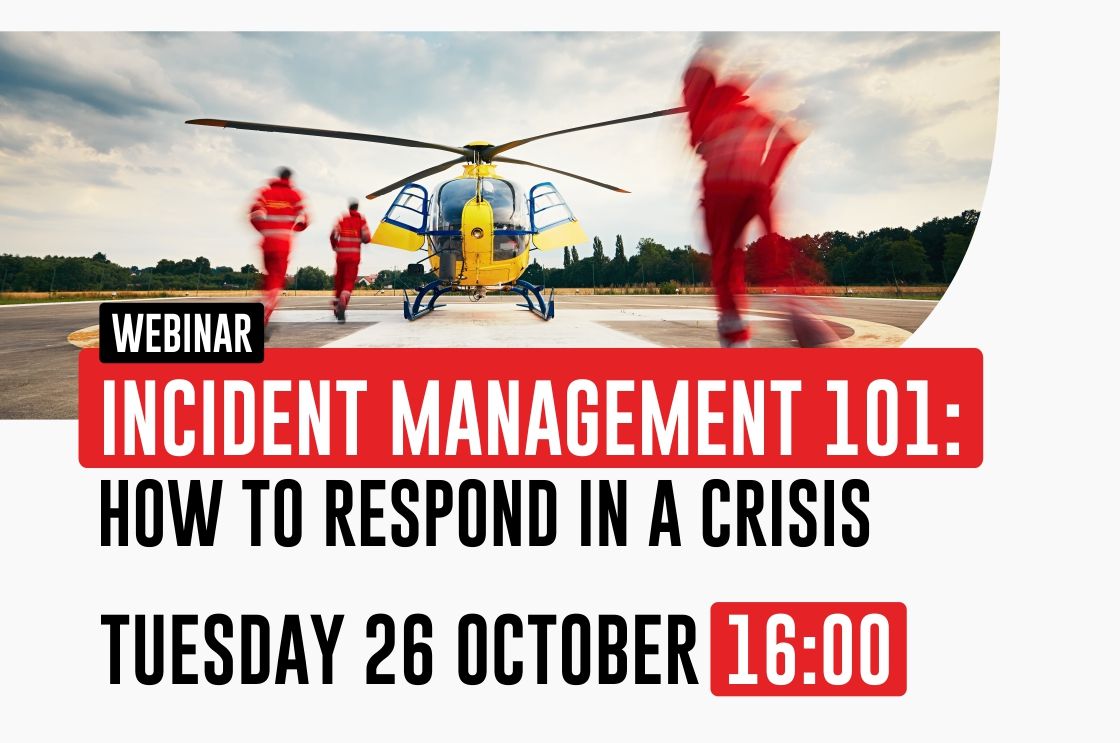Incidents happen, and often despite your best efforts to prevent them from occurring in the first place. The question is, are you adequately equipped to deal with whatever incidents come to light, both the somewhat predictable and the unpredictable?
Effective incident management planning and incident management is critical to ensure the the safety of your guests, your staff, and your reputation. Our experts weigh in on what to expect, how to take action to cover your establishment, and how to make proper incident management a priority going forward.
What incidents can a travel supplier expect to take place?
Of course, there are everyday incidents that travel suppliers can easily prepare for, such as helping visitors cope with the unfortunate onset of ‘traveller’s diarrhoea’ in a rural setting where pharmacies and doctors are in short supply (or completely non-existent). However, the truly dangerous incidents are those that are relatively challenging to foresee, but are sure to have dire consequences, like wildlife attacks, guests slipping and falling on your premises, or a guest being assaulted by a staff member (or vice versa).
“Ultimately, it’s impossible to avoid all incidents. There are certain things over which you have no control as an experience provider and establishment. You simply cannot prepare for every possible eventuality, which is why it’s so vital to have solutions in place and partners in your corner with experience in handling the unpredictable,” explains Lucien Niemann, Director of Medical Services at Special Projects & Services Limited.
Ruth Mmatli, General Manager at Once in Cape Town, provides the perfect example as to how an unforeseen incident can present itself, and how big of a relief it can be to have the necessary experts on hand to assist.
Ruth tells of her experience in dealing with a guest who caused significant damage to the items in her room and refused to settle the costs associated with repairing these damages. The guest was given the option to leave the establishment early to allow Ruth to utilise the balance of her booking to pay for the expenses, or to settle the damage-related bill separately. She refused both options and insisted on staying. The guest had health problems for which she required medication and claimed that she would hold Ruth liable if she didn’t assist her in obtaining her necessary meds. This is when Ruth called on SATIB24 for help. The guest even made death threats that she claimed would be carried out if Ruth did not allow her to remain in her room free of charge. To make matters worse, the guest was violent towards Ruth, security – and even the paramedics which arrived to help her. Eventually, the incident was resolved, and the guest was escorted offsite.
As per Ruth’s re-telling of the event, SATIB24 helped by providing thorough guidance throughout the incident, despatching the right crews (specialist paramedics) as well as providing support thereafter.
“SATIB was quick to organise trauma counselling for me – something I didn’t think was necessary until I went to bed that night and realised I couldn’t sleep! They were also ready with a crisis communication plan in the event that the guest attempted to damage the establishment’s reputation,” she says.
How to get started with incident management planning
Whether you’re talking about swimming pools, balustrades, walkways, vehicles, or equipment, Stefan de Beer, Director at Martin & de Beer Inc. cautions travel suppliers to make doubly sure that everything is in order and up to code before entertaining guests. Lucien agrees:
“It’s difficult to feel as though you’ve covered everything. That’s where the right incident management support comes in handy – offering the necessary foresight to identify potential incidents long before they actually occur.”
Stefan encourages travel suppliers to pay specific attention to conducting regular maintenance to maximise guest and staff safety.
“It’s vital to remember that functionality is just as important – in fact, more so – than aesthetics, and when it comes to functionality, the smallest details matter,” he comments.
Lucien warns that courts always look at what could have been ‘reasonably foreseeable’ when an incident is escalated to the authorities.
“Every aspect of service to guests may come under fire at some stage. As such, it’s wise to consider the types of incidents that could occur and to prepare sufficiently, ensuring all systems are in place. Cover what you know and leave the unpredictable and unforeseeable to the experts!”
Stefan elaborates:
“Take action by conducting risk assessments, take all possible precautions to prevent incidents from taking place, and put in the effort to create a custom incident management plan for your establishment.”
It’s crucial to understand that incident management frameworks are available, but there’s no definitive step by step guide that every establishment can follow. Frameworks provide a great starting point, but comprehensive risk assessments remain a must, particularly based on an establishment’s unique environment, team, experience(s) on offer, etc.
Your incident management basics
According to Lucien, there are two main aspects that are vital for effective incident management, namely knowing who to phone and when, and knowing who the establishment’s insurance provider is.
“Know how to get in touch with the relevant assistance in the event of a medical or security-related emergency. Better yet, put these contacts on speed dial! Secondly, make certain that all your staff members know who your establishment’s insurance provider is, keeping in mind that most policies come with an embedded incidence management provider ready and waiting to offer support and guidance in times of panic or uncertainty.”
Natalia Rosa, Managing Director at Big Ambitions also cautions travel suppliers not to forget about crisis communication.
“Have a crisis communication team in place. Have holding statements in place. Be proactive about providing information to the media and stakeholders without them having to look for it. Never leave an information vacuum. Instead, take control of your brand’s reputation immediately following an incident. At the end of the day, you don’t need to be a communications expert to have a crisis communication plan. However, you do need to be prepared!”
Final words of wisdom
To conclude, Ruth encourages all travel suppliers to trust their gut and get help when they feel it’s needed. Stefan pushes the importance of preparation when it comes to maintenance plans and staff training, while Lucien insists that the ability to adapt in the face of an emergency is critical.
“All travel suppliers need to realise that no matter how much they learn and how many incidents they deal with, no incident will ever be the same nor follow the same path. Know how to respond and adapt as required. The easiest way to do this is by leaning on the experts!”



